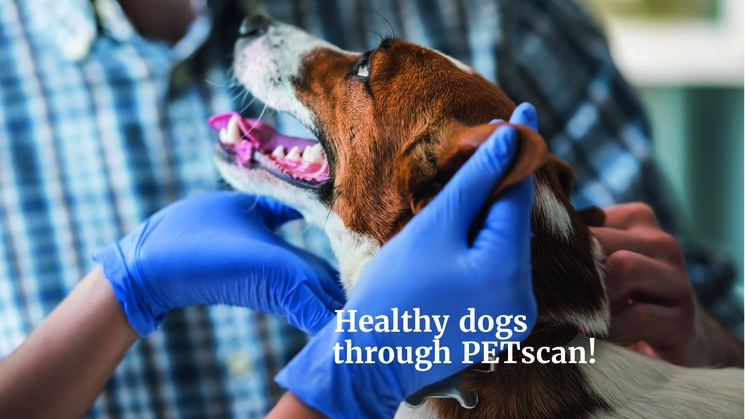Healthy animals through PETscan

Almost 60% of all households in The Netherlands have pets, with a total of no less than 33 million pets! Cats and dogs have been at the top of the list of most popular pets for years, but despite their popularity, the well-being and health of our pets are threatened due to high frequency of hereditary diseases. Hereditary diseases are very common in purebred dogs and cats, and unfortunately even animals that don’t show signs of disease can pass this condition on to its offspring.
The Expertise Centre for Genetics develops new methods to permanently combat hereditary diseases in purebred dogs and cats. With this project, the members of the Faculty of Veterinary Medicine want to introduce the system called PETscan that registers diagnoses made by veterinarians nationwide. These diagnoses give a better insight into which disorders are structurally seen in breeds. With this information we can develop suitable DNA tests and support breeders with scientifically substantiated advice.
To view a demo of PETscan click here.
Harmful breed characteristics and hereditary diseases
As animal lovers we often prefer a certain type of breed. Specific breed characteristics appeal to us and we enjoy seeing these characteristics in our own favorite pet. A lot of preferences for exterior characteristics that we find charming, can have serious negative consequences for the health and well-being of animals, such as short skulls, small noses, bulging eyes and folded ears. Excessive inbreeding by breeding with the same and often related parent animals also means that hereditary diseases are becoming more common. Liver shunts, cardiomyopathy, epilepsy or abnormal growth are just a few examples. There is no doubt that harmful breed characteristics and hereditary diseases seriously hinder the well-being of our pets.
Undesirable behavior in dog populations
In addition to physical ailments, it is known that behavioral problems of pets, especially dogs, pose a serious problem when it comes to animal welfare. Inadequately socialized dogs often show signs of stress and anxiety, while some of them show aggressive behavior that can lead to biting incidents that impair the well-being of the attacked dog. Unfortunately these incidents often result in death. Undesirable behavior of dogs is therefore frequently becoming a social problem.
Infectious diseases and zoonoses in dog populations in The Netherlands
Infectious diseases and zoonoses (infectious diseases that can be transmitted from animals to humans) are also posing an increasing risk for dogs in The Netherlands. The different causes of this includes the import of insufficiently vaccinated dogs from Mediterranean countries. Some of these dogs also suffer from infectious diseases that (with the presence of the correct vector) can spread to humans.
PETscan: for long-term monitoring and improvement of the health and welfare of companion animals
Although we do know to what extent a certain disease or condition affects the health and well-being of an animal, we still do not know enough about the extent of it in the Netherlands, let alone on an European or international level. This knowledge is desperately needed to ensure that our pets don’t suffer from preventable problems, both in short term and long term. Hence, why the Expertise Centre for Genetics wants to generate the necessary insight at national level. The information we will gather is to research the following: type of disorders registered, its symptoms, in which species and breed it is seen, with what frequency, and where in the country it occurs.
Once we have this information, we can give advice and/or develop policies to inform and help veterinarians, associated organizations and authorities to take the necessary measures to protect animal health and well-being. In addition, we can do follow-up research about the genetic background of hereditary disorders and develop DNA tests. This will be valuable information to incorporate into breeding advice to ensure that hereditary disorders occur less frequently in the future, and that more healthy animals with as much genetic variation as possible is born.
Introducing the registration system PETscan to veterinarians in The Netherlands will be the key to achieve all mentioned above.
What is PETscan?
The Expertise Centre for Genetics has developed the registration system PETscan. PETscan enables veterinarians in The Netherlands to register the diagnoses made in dogs and cats from their practice in the central database of the Expertise Centre for Genetics. These diagnoses are processed anonymously and then analyzed. Within this system it’s currently possible to register (hereditary) diseases, breed related characteristics and infectious diseases. Useful articles, breed predispositions and DNA tests are also incorporated in PETscan as additional information for veterinarians.
PETscan has thus been developed as an indispensable tool to enable veterinary medicine to quantify health problems in the entire population of companion animals, and to further develop policies to combat identified problems.
Can we count on your support?
Your support is needed to implement PETscan on a wide base, to combat harmful and preventable diseases in our deserving dogs and cats!












